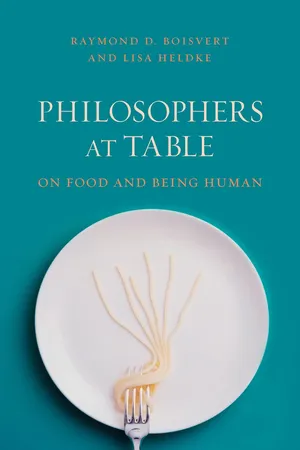![]()
References
Introduction
1 Liz Else, ‘Mary, Mary, Quite Contrary’, New Scientist, 2315 (3 November 2001), www.newscientist.com.
2 Mary Midgley, Utopias, Dolphins and Computers: Problems of Philosophical Plumbing (London, 1996), p. 1.
3 Ibid.
4 Ibid., p. 2.
5 The American philosopher Charles Peirce called this the ‘method of tenacity’, and he had considerable admiration for it. He suggested that the capacity to put on blinders and refuse to acknowledge any alternative views was a method of establishing beliefs whose merits were inferior only to the scientific method. He wasn’t kidding. Philosopher of science Paul Feyerabend suggested that ignoring – not refuting – alternative views is exactly what science does, science at its best. In a less polemical way, his fellow philosopher of science Thomas Kuhn suggested that science ‘progresses’ in a kind of galumphing alternation between ‘normal science’ – a period during which our most basic plumbing works are taken as given and correct, and in which repair projects are confined to installing new fixtures and repairing faucets – and ‘revolutionary science’, periods in which an irresolvable problem causes an entire system to be called into question. It is only during these periods of paradigm shift that the most elemental assumptions can be examined and disputed. Kuhn notes that normal scientists will hobble along for a very long time with a system that isn’t answering some of their most pressing questions before they will resort to a reconsideration of their most foundational beliefs. The more people invested in a system, the more likely it will be preserved despite the seriousness of its limitations. Note that there is nothing the least bit paradoxical about such an approach. On the contrary, the alternative is the paradoxical move.
6 Midgley, Utopias, p. 2.
7 Ibid., p. 11.
8 Ibid., p. 13.
9 Ibid., p. 3.
10 Ibid., p. 14.
11 Ibid.
12 Susanne Langer, Philosophical Sketches (New York, 1964), p. 13.
13 Susanne Langer, Philosophy in a New Key (Cambridge, MA, 1957), p. 293.
14 See John Dewey, The Quest for Certainty, in The Later Works (Carbondale, IL, 1929; 1984), vol. IV.
15 John Dewey, Democracy and Education (New York, 1922), pp. 335–6.
16 Sandor Katz, The Art of Fermentation (White River Junction, VT, 2012).
17 Ibid., p. xviii.
18 Ibid., pp. xviii–xix.
I Hospitality is Ethics
1 Jessica Bruder, ‘The Picky Eater who Came to Dinner’, www.nytimes.com, 29 June 2012.
2 An actual headline: Jim Thornton, ‘Is This the Most Dangerous Food for Men?’, www.menshealth.com, 19 May 2009.
3 Michael Pollan, The Omnivore’s Dilemma: A Natural History of Four Meals (New York, 2006), p. 314.
4 Jessica Bruder, ‘Feeding Others’ Food Issues’, www.timesunion.com, 6 July 2012.
5 We have borrowed the notion of ‘generative idea’ from Susanne Langer, Philosophy in a New Key (Cambridge, MA, 1957).
6 Lisa Heldke, ‘Foodmaking as a Thoughtful Practice’, in Cooking, Eating, Thinking: Transformative Philosophies of Food, ed. Deane W. Curtin and Lisa Heldke (Indianapolis, IN, 1992), p. 203.
7 Here is a typical passage from Aristotle: ‘By virtue I mean virtue of character; for this [pursues the mean because] it is concerned with feelings and actions, and these admit of excess, deficiency and an intermediate condition. We can be afraid, e.g., or be confident, or have appetites, or get angry, or feel pity, in general have pleasure or pain, both too much and too little, and in both ways not well; but [having these feelings] at the right times, about the right things, towards the right people, for the right end, and in the right way, is the intermediate and best condition, this is proper to virtue. Similarly, actions also admit of excess, deficiency and the intermediate condition.’ See Aristotle, Nicomachean Ethics, trans. Terrence Irwin (Indianapolis, IN, 1985), 1106b: pp. 18–24.
8 Donna Gabaccia, We Are What We Eat: Ethnic Food and the Making of Americans (Cambridge, MA, 1998), p. 125.
9 Ibid., pp. 124, 123.
10 Ibid., p. 125.
11 Ibid., p. 126.
12 Ibid., p. 125.
13 Ibid., p. 127.
14 Emmanuel Levinas, Totality and Infinity: An Essay on Exteriority, trans. Alfonso Lingis (Pittsburgh, PA, 1961), is one of the most prominent.
15 See Henri Bergson, The Two Sources of Morality and Religion, trans. R. Ashley Audra and Cloudesley Brereton (Garden City, NJ, 1932; 1956).
16 Annia Ciezadlo, Day of Honey: A Memoir of Food, Love, and War (New York, 2011), p. 77.
17 William Bryant Logan, Dirt: The Ecstatic Skin of the Earth (New York, 1995), pp. 18–19.
18 Ibid., p. 19.
19 Of course, in offering the farmer as representative figure, we do not mean to suggest that all farmers are virtuous.
20 Some philosophers who challenged this ideal were Charles Sanders Peirce (1839–1914), Ludwig Wittgenstein (1889–1951) and William James (1842–1910).
21 Homer, The Odyssey, trans. Robert Fagles (New York, 1996), pp. 100–101.
22 Ibid., pp. 195–6.
23 Homer, The Iliad, trans. Richard Lattimore (Chicago, IL, 1961), pp. 119ff.
24 ‘In other words, there ...
